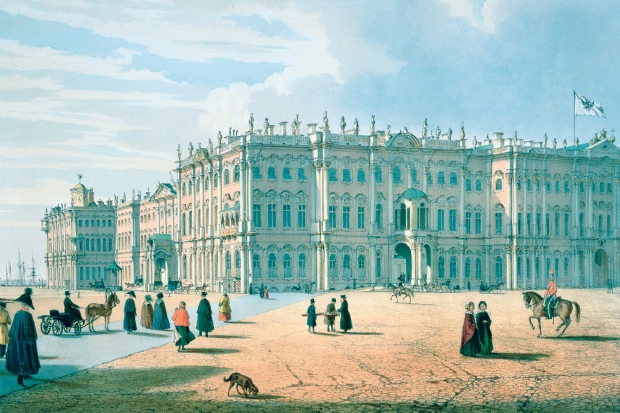The front cover of this book describes the Hermitage as ‘the Greatest Museum in the World’. That sobriquet must go to the Louvre. The Hermitage is perhaps the second greatest, one which its current director Mikhail Piotrovsky calls an ‘encyclopaedic’ museum, housing ‘the culture of humanity, which is represented in all its variety…’ Not quite. Like the Louvre or the other encyclopaedic museums, the Met in New York say, or the Kunsthistorisches in Vienna, it does not incorporate primitive or folk art. London doesn’t have anything directly comparable: it would be as though the British Museum, the National Gallery, the Victoria and Albert, the Royal Collections and a bit of Tate Modern were all rolled into one.
We learn that it currently attracts three million visitors a year, whereas in the late Soviet era it was four million. Immediately after the collapse of communism it went down to one million, and this was the period when I lived a few doors away from it on Ulitsa Khalturina and came to know the Hermitage well. It was so quiet, especially in winter: the best time to visit. You could wander in and out for a very modest fee. A friend of mine worked there, but there was no work for him to do, so he was always on holiday and would take me behind the scenes. The restoration department seemed to have come from the late Renaissance. Among the staff, you saw something you don’t always see in Russia, happy people with bright eyes, smiling and making jokes (well, they do work in the most delicious place in town). Football was played in its inner courtyards. There were dancing bears by the south portico, and gypsies covered in soot rushed at you in Palace Square. One day I saw boys staving in the basement windows of the General Staff building with the front wheels of their bicycles — something had to change, and it did.
What also astounded me were the floors. St Petersburg has the most beautiful wooden floors in the world, many of them in the Hermitage. I wonder why Piotrovsky doesn’t mention them. How I felt for those floors, trodden on by hordes down the centuries — and with no overshoes! But however many times I visited the place, I never mastered it. I nearly always got lost; artefacts or rooms I wanted to revisit but could never find again. Quite right too. A great museum has to be a labyrinth in which you become lost; it’s part of the magic.
With the Hermitage this is exacerbated by its lack of internal cohesion. The museum comprises the Winter Palace and sundry annexes, both historical and recent. What is striking about the Winter Palace is that behind its ethereal eau de Nil façade no room relates stylistically to any other; and the same goes for the various Hermitage extensions. Here a copy of the Raphael Loggia, there a version of English Palladianism, beyond them a hall in Russian neo-classicism, now the weird Malachite Room or a quasi-Greek temple, or rococo boudoir or forest of golden columns, or vault of an unidentifiable kind — Gothic, Byzantine, Saracenic? It evokes the sense of a remote despotism playing cultural catch-up, wanting things of every possible sort, with no overall pattern. And like the Louvre’s, its content has been further engorged by revolution and mass confiscations. Sokurov’s film Russian Ark tried to impose a pattern by taking you through the Hermitage in one shot. It didn’t work. The film is somehow fogeyish, failing to capture the museum’s crazy splendour.
Piotrovsky’s book reflects this incoherence. For a start it is not remotely the book I thought it was going to be. Piotrovsky’s father was also a director of the Hermitage, and Mikhail is sitting on an Everest of personal anecdote and insider knowledge. Very little of that makes it into these pages. Actually it’s a dossier: of nearly 400, fewer than 70 full pages are written by Piotrovsky. The rest are illustrations with extended captions supplied by others. But even Piotrovsky’s contribution seems to have been put together by a number of committees: it is awash with non sequiturs, unexplained references, repetitions, special pleading disguised as assertion, and manipulative phraseology (‘democratic aristocratism’ is worthy of Dean Swift). There are some weird errors (Piotrovsky doesn’t know that ‘dialogue’ was invented by the Ancient Greeks). And the translation can only have made it worse: murky, poorly punctuated. Just to ensure you remain pretty clueless, annotated floor-plans are omitted. The illustrations, however, are fabulous.
No major issues are entirely avoided. The sales from the Hermitage by the communists are mentioned in several places, though not itemised (the best went to Andrew Mellon via whom in due course they formed the core collection of the National Gallery in Washington). The Hermitage works claimed by Germany are dealt with in a special insert which appears not to have been written by Piotrovsky at all. Entitled ‘Displacing Displaced Objects’ it is in a different typeface and on different coloured paper from the Piotrovsky pages. It is more or less incomprehensible and in places petulant — the Russian case, which I hope is a reasonable one, is not well served by it.
Not a single Soviet leader ever made an official visit to the Hermitage; and it was thought that after years of oppression, post-Soviet St Petersburg would burst into a great era of creativity. But alas, uptight, puritanical Putinism has turned the city into even more of a cultural backwater than under late communism. So I wonder if Piotrovsky will ever be able to write the book which is really in him. Traditionally Russians have had to go into exile to do such things. I expect they still do.






Comments